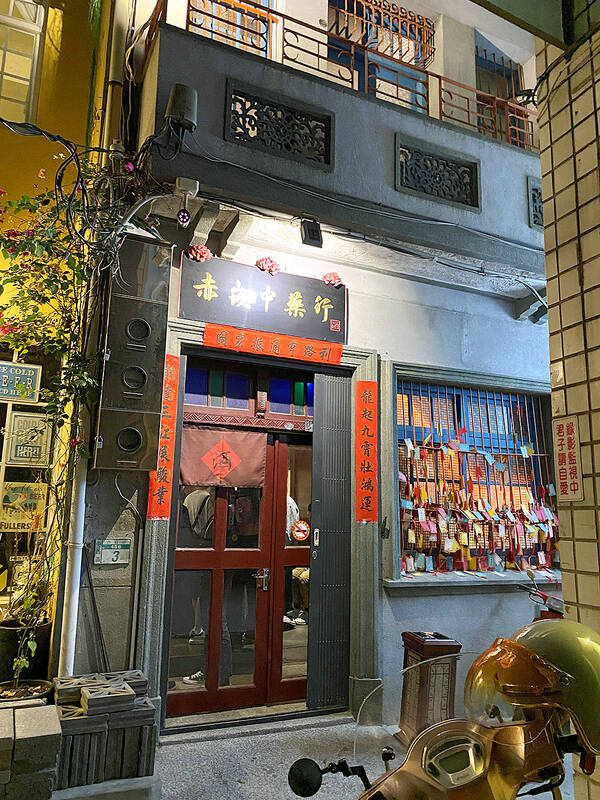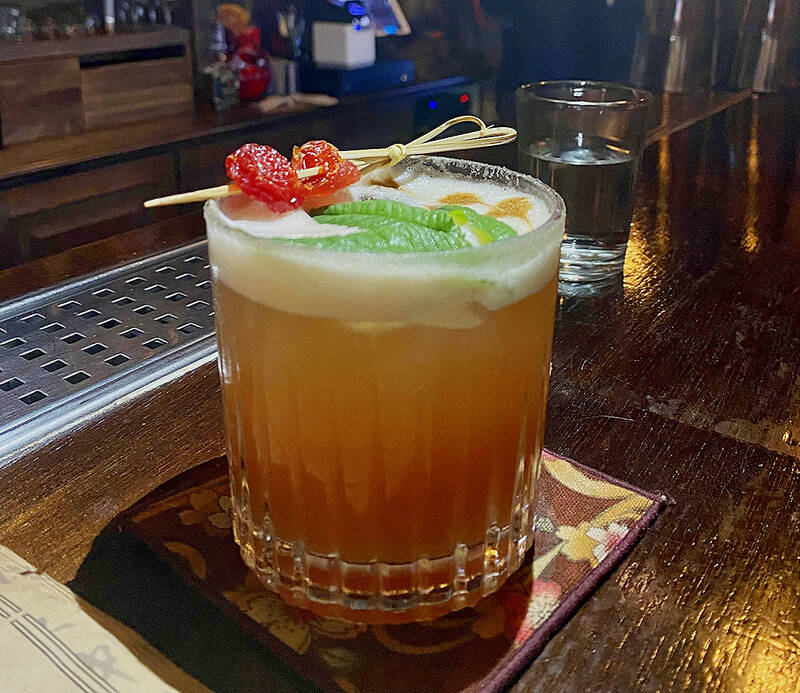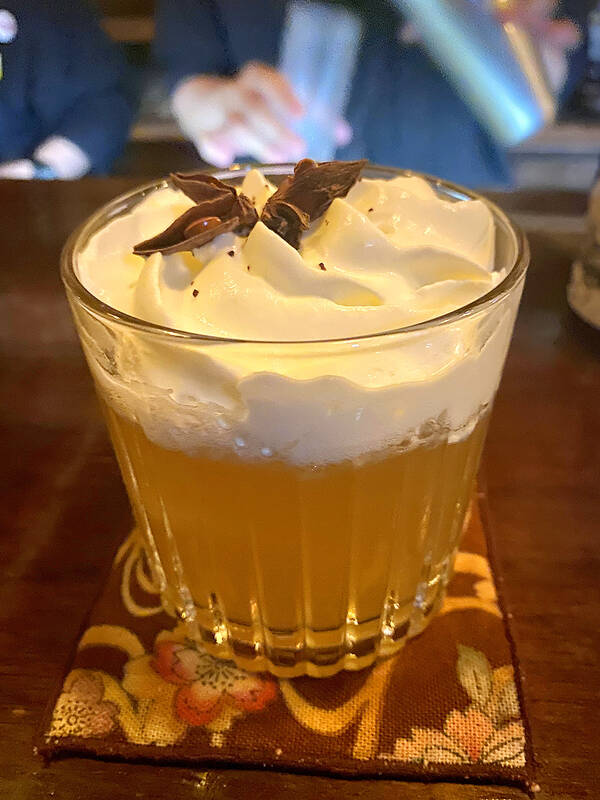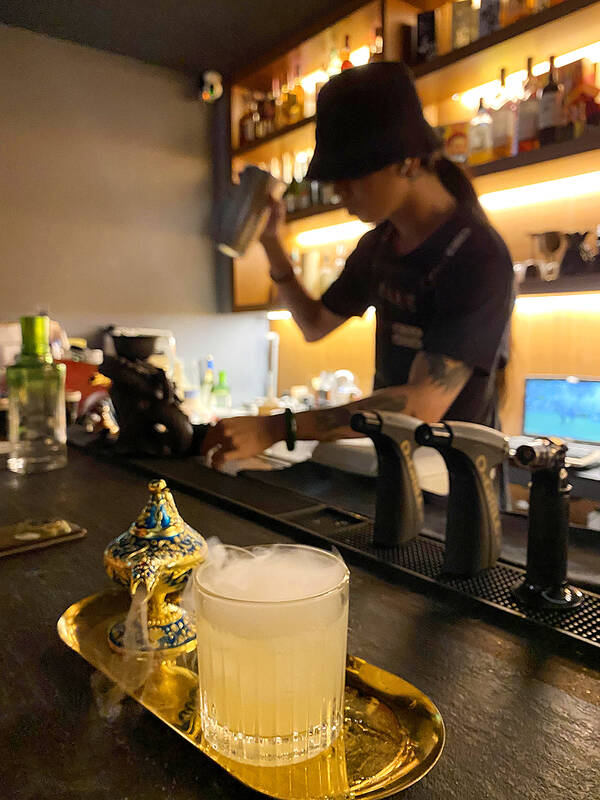When picturing Tainan, what typically comes to mind is charming alleyways, Japanese architecture and world-class cuisine. But look beyond the fray, through stained glass windows and sliding bookcases, and there exists a thriving speakeasy subculture, where innovative mixologists ply their trade, serving exquisite concoctions and unique flavor profiles to rival any city in Taiwan.
Speakeasies hail from the prohibition era of 1920s America. When alcohol was outlawed, people took their business to hidden establishments; requiring patrons to use hushed tones — speak easy — to conceal their illegal activities.
Nowadays legal, speakeasy bars are simply hidden bars, often found behind bookcases or secret doors that retain that old-school cool, bluesy jazz vibes of the roaring 20s. Consider the modern speakeasy as a game of hide-and-seek, an “insider secret” that needs to be discovered. Expect to pay a little extra for premium ingredients and service but the experience drinking in a clandestine waterhole is worth a few extra dollars.

Photo courtesy of Hollie Younger
CRAWLING TAINAN
Hordes of tourists pouring into Chikan Temple every day remain unawares that just opposite, tucked down a conspicuous side alley, lies Chikan Pharmacy (赤崁中藥行).
Opened in 2020, its owner took inspiration from the speakeasies of New York and Hong Kong and added a Taiwanese twist, showcasing the lost art of Traditional Chinese Medicine. Their cocktail menu leans towards the medicinal, herbal and even slightly bitter, with a strong focus on gin.

Photo courtesy of Hollie Younger Warning: Excessive consumption of alcohol can damage your health.
On the sweeter side, we recommend Straw (NT$400) a complex blend of gin, tea and spices topped with whipped cream, or test your palette with The Jerry Springer Show (NT$400). The combination of curry spices, rum and Earl Grey packs a punch as strong as its namesake’s TV guests. This venue is jam-packed until the early hours, so reservations are recommended in advance.
Once our appetite is sufficiently wet, we head to our second location, Speakeasy Bar (民生大戲院), arguably the best of Tainan’s speakeasies. Fantastic drinks, Instagram-worthy presentations and a quirky, classically speakeasy entrance. If you visit just one bar, make it this one. The facade looks like an old-school movie theatre, with billboards and posters. We approach and, seeing no other entrances, push the elevator button. Steeping out to check which floor we’re heading to we find the opposite panel of the elevator slides away to reveal the low lighting of a lively cocktail bar. Bingo!
A vintage cinema theme is retained throughout, with a cult film classics playing via a projector at the back of the bar. The has no menu so there can be no recommendations: staff will simply ask if you prefer sweet, sour, bitter — or, you can point to one of the fanciful creations being enjoyed by your fellow patrons with a casual “I’ll take what they’re having.”

Photos courtesy of Hollie Younger Warning: Excessive consumption of alcohol can damage your health.
Genie lamps, ornate vases, hip flasks hidden in bibles — the experience is reminiscent of an antique store that ran out of glasses. Smoke cascades from the nostrils of the black clay dragon which dispenses a cocktail into the awaiting teapot below. Everything bubbles and steams; these guys love dry ice and they’re not afraid to use it.
Expect to pay around NT$400 per cocktail.
GREAT NIGHTCAP

Photo courtesy of Hollie Younger Warning: Excessive consumption of alcohol can damage your health.
To wrap up the night, we head to our final and most unassuming speakeasy, Eureka (發現酒吧). Wall walking around a parking lot on a residential street, we begin to question the location provided by Google Maps. But on an otherwise bare wall to our right is a stand-alone bookshelf, mysteriously lit from above. Slide it to the side and “Eureka!” the bar is revealed.
This spot features a masterfully crafted menu and a more relaxed vibe: jazz music plays, and the bartenders have time to stop and socialize with customers.
Saving the best for last, our favorite cocktail of the night was the Thatch Under Tree (NT$350). Made from rum shaken with coconut water, passionfruit, marigold and the star ingredient, lemongrass it was subtle, herbaceous and easy to drink.
Word on the street is, speakeasies are popping up all over Tainan, so keep your eyes peeled but your lips sealed — one could be right under your nose.

This month the government ordered a one-year block of Xiaohongshu (小紅書) or Rednote, a Chinese social media platform with more than 3 million users in Taiwan. The government pointed to widespread fraud activity on the platform, along with cybersecurity failures. Officials said that they had reached out to the company and asked it to change. However, they received no response. The pro-China parties, the Chinese Nationalist Party (KMT) and Taiwan People’s Party (TPP), immediately swung into action, denouncing the ban as an attack on free speech. This “free speech” claim was then echoed by the People’s Republic of China (PRC),

Exceptions to the rule are sometimes revealing. For a brief few years, there was an emerging ideological split between the Democratic Progressive Party (DPP) and Chinese Nationalist Party (KMT) that appeared to be pushing the DPP in a direction that would be considered more liberal, and the KMT more conservative. In the previous column, “The KMT-DPP’s bureaucrat-led developmental state” (Dec. 11, page 12), we examined how Taiwan’s democratic system developed, and how both the two main parties largely accepted a similar consensus on how Taiwan should be run domestically and did not split along the left-right lines more familiar in

Many people in Taiwan first learned about universal basic income (UBI) — the idea that the government should provide regular, no-strings-attached payments to each citizen — in 2019. While seeking the Democratic nomination for the 2020 US presidential election, Andrew Yang, a politician of Taiwanese descent, said that, if elected, he’d institute a UBI of US$1,000 per month to “get the economic boot off of people’s throats, allowing them to lift their heads up, breathe, and get excited for the future.” His campaign petered out, but the concept of UBI hasn’t gone away. Throughout the industrialized world, there are fears that

Most heroes are remembered for the battles they fought. Taiwan’s Black Bat Squadron is remembered for flying into Chinese airspace 838 times between 1953 and 1967, and for the 148 men whose sacrifice bought the intelligence that kept Taiwan secure. Two-thirds of the squadron died carrying out missions most people wouldn’t learn about for another 40 years. The squadron lost 15 aircraft and 148 crew members over those 14 years, making it the deadliest unit in Taiwan’s military history by casualty rate. They flew at night, often at low altitudes, straight into some of the most heavily defended airspace in Asia.